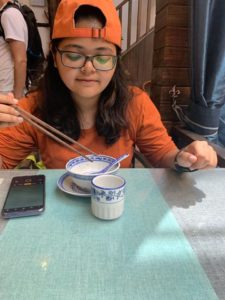Post By: Ms. Apoorva Kulkarni
Learning Mandarin at Jinhua Homestay Project
Ni Hao!
It is an exhilarating and slightly surreal feeling to be sitting in China and typing out this blog. As a student of the Chinese language at The Oriental Dialogue (Pune), I had been seeking an opportunity to come and visit this beautiful country. If you are already a student of Mandarin, then you know how fascinating and unique this language is. If you aren’t a student of the language, then maybe you are fascinated by the country itself. Because China is a superpower, it is a roaring dragon and China is the present and the future of East Asia.
When my teachers at The Oriental Dialogue told me about the Jinhua Homestay Project, I was immediately interested in it. I am so grateful to them for helping me grab this once-in-a-lifetime opportunity of experiencing China in the most authentic way possible. Under this project we live in a Chinese village, with a Chinese family and explore the magical land of China. We meet people from all walks of life and from all over the world. We get to talk to the Chinese locals, watch and learn Chinese art forms and eat Chinese food. What could be better!
One of the major reasons why I applied for the Jinhua Homestay Project was to gain exposure to the Mandarin language. This project allows you to soak in the language in every way possible – whether spoken or written. Its literally everywhere! So you are constantly learning new words and reading new characters.
China has a variety of regional languages, similar to India. But all Chinese people can speak Mandarin. The people of Jinhua do speak Mandarin, but they have a slightly different dialect than the people in say, Beijing. But since, we are not native speakers we are hardly able to make out the difference.
The locals here speak really, really fast! It’s almost like they are in a hurry to get all the words out and get on with their work. I have to tell my Chinese volunteer friends to speak slowly so that I can try to understand what they are saying. But I can proudly tell you that there are some words that I can identify even when they speak quickly, like Jintian, Mingtian, Zhe ge, Shouji, Dian nao etc. I also try to speak in Chinese with them every day (but that’s not very easy!) and they encourage me a lot.
The Chinese people speak their language without diluting it with English words. So, when travelling or working here, it is important to know the exact words for even simple things like a chair (yizi), pen (bi), chopsticks (kuaizi) and so on. Having the Pleco app on your phone proves very useful especially if you are someone like me who is still a beginner in the language. But if you keep paying close attention to the locals talking around you, you end up learning new terms every day. For example, I learnt the term “zou ba, zou ba, zou ba” which means (lets go, lets go, lets go). Since the Chinese people are a lot like us, they too like to repeat some words for higher impact on the listener’s mind. Some other words that are commonly used here are – hao (good), hao de (good/okay), hao chi (tasty), hen hao (very good), fei chang hao (extremely good), shen me (what), xiexie ni (thank you), zaijian (good bye) and bu keqi (no formalities).
Since Mandarin has a pictorial script, all the sign boards, information brochures, books and even phone texts have the traditional hanzi (Mandarin characters). There is literally no pinyin! So if you are like me, heavily dependent on pinyin, then maybe now is the right time to focus on your hanzi more than your pinyin. Because out here its only hanzi!!!! I have been working on memorizing simple hanzi by reading sign boards and small instruction cards every day and I think my vocabulary has definitely improved.
Before I got here, I used to think, “Wow! I chose a really difficult language to learn.” But thanks to the Jinhua Homestay Project, now I think, “Wow! I chose a really interesting and widely spoken language to learn.” Now, I cannot wait to come back to India and restart my lessons. This project and my teachers at The Oriental Dialogue have helped me fall in love with a new country, a new culture and of course a beautiful language.
Xiexie Ni!





Comments are closed.